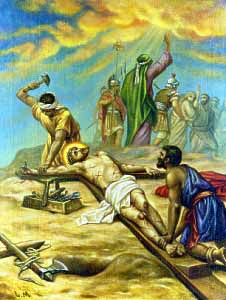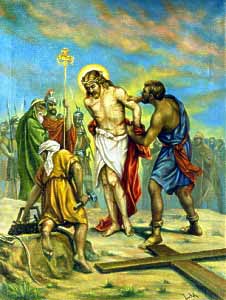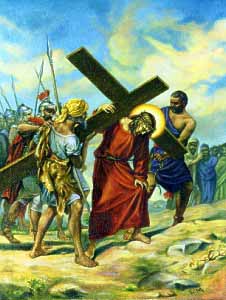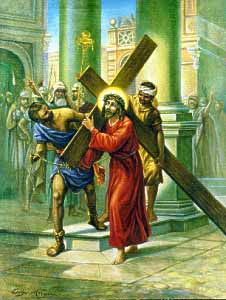THE SECOND EUCHARISTIC PRAYER
Rooted in a prayer of the priest St. Hippolytus going back to the earliest days of the life of the Church it is thanks to the Second Vatican Council we celebrate once more the Holy Sacrifice of the Mass within this ancient tradition.
A couple of points: scholars may debate the exactness of whom St. Hippolytus was, or how much of his ‘prayer’ is actually in this Canon, however I do sense in my heart that each time we priests pray this Canon, as with the “Roman Canon”, let us strive to be profoundly aware of all priests who, over the millennia, have celebrated Holy Mass and many, most recently in the last century in concentration camps, in the camps of the Gulag, and still in many places of the world where the Church is under assault have/do embrace martyrdom for the faith.
The second point is well known, indeed I admit sometimes doing so myself, namely using this Canon because, bluntly, it is the shortest one.
Speed defeats being seeped in the very Mystery we celebrate!
Lord, You are holy indeed, the fountain of all holiness.
In some ways a simple sentence, yet so filled with truth the heart should tremble with exultant amazement!
We stand before the All Holy One who does not keep holiness within Himself but lavishes this shimmering light filled reality, this fullness of love and life upon us.
When I was a boy I used to enjoy drinking the ice cold water flowing, it seemed, ceaselessly from drinking fountains in the huge park known as the Public Gardens, in the centre of which was a huge, ornate bronze fountain which showered water from a variety of spouts.
Perhaps the greatest, most thunderous ‘fountain’ I have ever gazed upon, listened too, bathed in the spray from, is Niagara Falls.
Even that massive cascade is like a tiny drop from an eye dropper compared to the endless river of holiness which is poured upon and into our being from ‘the fountain of all holiness.’
Let your Spirit come upon these gifts to make them holy,
When I first began this site, began the various meditations and reflections within it, I never expected to be exiled, never expected to be forbidden ‘public’ ministry, never expected I would eventually be so heartbroken by the number of priests who have committed suicide that, while continuing to pray for each, would stop counting how many there are.
In the ensuing years since I wrote the first mediation on the Roman Canon I have been diagnosed with PTSD, struggled through depression by grace, therapy and medication, and am learning that this hidden life of pain and prayer, these are the gifts co-mingled with the bread and wine on the altar.
Each priest who celebrates Holy Mass, and wherever he celebrates, as well as every man, woman and child who participates in Holy Mass, each are themselves, along with all their labours and struggles, faith and doubts, joys and sorrows, sins and virtues co-mingled with the bread and wine, and so when we call upon the Holy Spirit, while first and foremost we are asking Him to come upon the bread and wine we also ask He come upon the fullness of our own being.
so that they may become for us the body and blood of our Lord, Jesus Christ.
The Servant of God, Pope John Paul II, famously cried out to families to “become what you are.”
When we are nourished by Jesus Eucharist we can become what we are by baptism, more and more fully, more and more disciples, witnesses, heralds of the Gospel of Life, salt of the earth, light shining in the darkness of the culture of death.
Before he was given up to death, a death he freely accepted,
Now in my mid-sixties when I pray these words I am struck in particular by the words ‘before, death and freely accepted.’
What am I willing to freely accept for love of Jesus before my own death?
Indeed, for love of Jesus, am I willing to freely accept death?
I mean here not just physical death but the death of the false self, death of my own life plans, death of the way I think things should be not only in my own life but the life of the Church, priesthood, of the world.
The death of my wants, even needs.
he took bread and gave you thanks.
A dear friend asked of me out of the blue the other day: “Do you give thanks?”
At first I was somewhat nonplussed because the question was so unexpected and I don’t recall ever being challenged about ‘thank-you’ since I was a child!
By the grace of God I was able to affirm to my friend that giving thanks is for me like breathing, from awaking in the morning giving thanks for another day of breath of life, and so on throughout the day.
However so frequently in the Holy Gospel, and not just in the accounts of the Last Supper, is Jesus presented to us giving thanks that clearly this is something critical He wishes us to do in imitation of Him.
Holy Mass is the ultimate act of thanksgiving.
It is also, if we embrace this gift, the source of our own capacity to give thanks.
He broke the bread, gave it to his disciples, and said:
I will admit right off here that any personalizing of the rites of Holy Mass disturbs me greatly in the very depth of my being, hence when I see priests who use this Canon, or any Canon, blatantly breaking the Host while proclaiming the above words, yes my being shudders because, more than a serious violation of the rubrics it is out of order.
Jesus, my Lord and my God upon the Cross has His heart broken open, from which open Heart flows the life of the Church.
By His strength, nourished and sustained by Him, I am able to accept having my own heart broken open, that He may enter as He yearns [cf.Rev.3:20] and also that every human being may enter my heart so I might love and serve them as Jesus does.
Part of having my heart broken open is to serve the Church as She wishes to be served, thus Her rubrics, fidelity to them, are one way to serve.
{Of course I never, outside of the celebration of Holy Mass, utter the next words, even though I pray the words of the Canon as I write.}
When supper was ended, he took the cup.
Have you have gazed into an empty cup, chalice?
I mean really contemplated the emptiness?
It is a reality we perhaps don’t think that much about, any more than we focus that much on the beating of our hearts or the reality this entire earth is wrapped in air.
We know air exists, we know we breathe, we also know when air is in rapid movement we feel the caress of a gentle breeze, the exhilarating splash of ocean spray when winds gust or of snow tingling our face in a blizzard.
Mostly though, we rather take the air for granted.
Same thing: with the space, the empty place, of a cup or chalice.
There must be some solid form for there to be that ’emptiness’, which itself finds purpose when its awaiting is fulfilled with hot coffee or cool water on a hot summer’s day.
Jesus we know emptied Himself for us.
If we truly yearn to experience the fullness of Himself poured into us, we must allow the Holy Spirit to empty us of all that is not Jesus.
Again he gave you thanks and praise, gave the cup to his disciples and said:
Outside of the praise-prayers in the Divine Office or within Holy Mass, how often do I praise the Father, the Son, the Holy Spirit?
How much of my prayer is about what I want or think I need?
How much is intercession for others?
When I invite the people and my own heart to proclaim the mystery of faith, is this automatic or truly a wellspring of praise, gratitude, witness from my heart?
In memory of his death and resurrection, we offer you, Father, this life-giving bread, this saving cup.
Friends are deeply involved in the ecumenical movement in England and wrote recently about how some Methodist friends said they wished they could believe what Catholics believe about Holy Mass and the Eucharist.
That truly is the deepest aspect of the divisions within Christianity, for tragic as it is that those Churches which have sustained Apostolic succession, therefore the reality of Sacramental Priesthood and Eucharist yet refuse each other shared Holy Communion, even more tragic is the situation of millions of Christians whose ancestors broke that succession, leaving a hunger for Holy Communion, but do not have it.
Equally tragic: those Roman or Orthodox, Protestant, who presume inter-communion before fullness of union.
During every Holy Mass our hearts should yearn for, and beg for, the day when, truly, we will all be one in Him.
We thank you for counting us worthy to stand in your presence and serve you.
We are counted as worthy because we are sealed in baptism and this standing in His presence, the presence of the Father, we are able to do by the action of the Holy Spirit.
Granted most fully and perfectly in Holy Mass, but nourished and sustained by Jesus our Eucharist, every time in each moment we are faithful disciples we are standing and serving.
May all of us who share in the body and blood of Christ be brought together in unity by the Holy Spirit.
Because I celebrate Holy Mass ‘alone’ each day in the hermitage, being among the thousands of priests dismissed from public ministry, and like hundreds falsely accused and yet punished without due process, I am able to take as long with each celebration as I wish: something not possible for priests in parish or other public ministry.
That said when I linger over the above prayer in the Canon I need to look deep in my own heart about my unity, or not, with my Bishop who has acted as he has and cast me out.
Do I truly love and forgive him, remain filially in Christ united with him, my brother priests, indeed with the entire Church, my enemies, the whole human family?
Unity is a Eucharistic grace but it is also a choice of the heart to dwell and act within this grace, or not.
Only if I truly embrace the grace of unity can I sincerely pray as follows:
Lord, remember your Church throughout the world, make us grow in love, together with N. our Pope, N. our bishop, and all the clergy.
The Eucharist, sacrament of communion of love!
Here sometimes I need to struggle, more than linger with affection!
To love, to forgive are not emotions, even though as beings who have emotions we sometimes ‘feel’ love or forgiveness, often as what we need, feeling-wise, but yeah, sometimes as the emotional experience of what we give.
Sometimes a particular Pope, Bishop, Priest, can be, emotionally, very difficult to love, to forgive and then how real is our request that the Lord make us grow in love?
Granted all the above is stating the obvious but in the Gospel context of ‘leaving your gift on the altar and going…’ sometimes here we need to be still and in our hearts go and choose love, choose forgiveness as an act of the will.
Since likely for most of us our emotions are the last wounds to be healed, perhaps only as we are crossing the threshold of hope on our deathbed, best not to focus on what we ‘feel’ in the moment, but rather, by grace, rejoice with what we choose!
Remember our brothers and sisters who have gone to their rest the hope of rising again; bring them and all the departed into the light of your presence.
I am always struck by the profundity of the Memorial of the deceased brothers and sisters in each of the Canons.
It is extremely sacred, but also, if we stand back and really reflect upon it, a deep moment of personal and communal immediate and ancestral awareness, for we can allow all of human history, or rather every human being since Adam and Eve, to pass through the memory of our hearts and the intent of our prayer, confiding each to Divine Mercy.
Here we recognize and honour the ultimate sacrifice of Jesus for the redemption of human beings, and when we pray ‘all the departed’ we confide to His mercy those who, for whatever reason, never met Him or knew Him during their earthly life.
It is a simple prayer of great charity!
Have mercy on us all;
In this moment, in this cry for Divine Mercy, while the “us all” refers in the first instance to those participating in the specific Holy Mass, it is also a cry for the entire Mystical Body, indeed for the entire human race.
Our priestly hearts should be open to a profound awareness of the hopes and anxieties of the entire human family.
make us worthy to share eternal life
Humility in prayer, in imitation of Jesus our perfect prayer to the Father, Jesus of the humble heart, is a stance in truth!
Only Jesus can make us worthy of eternal life and the very sacrifice of the Mass is the truth of His redemptive action on our behalf.
with Mary, the virgin Mother of God,
Pope John Paul chose TOTUS TUUS as his motto: “totally yours”, totally Jesus’ through Mary, a template truly for every baptized life, most especially every priestly life.
with the apostles, and with all the saints who have done your will throughout the ages.
This emphasis on union with the Communion of Saints, both the canonized and not, that is with all our brothers and sisters in heaven, harkens both to Jesus’ word that true believers are not those who exclaim with awe that Jesus is Lord, rather those will, Jesus states clearly, enter heaven who do “…the will of My Father in heaven.” [cf. Mt. 7:21, 22]
May we praise you in union with them, and give you glory through your son, Jesus Christ.
In the book of Revelations we see various examples and hymns of praise, and here we anticipate our participation in that very praise in heaven, by uniting our praise here on earth, with theirs, all in and through Jesus.
Thus the Church wisely urges, if not the entire Canon, at the very least for the priest to sing out the Doxology, more prelude than conclusion of the Canon, prelude to the great prayer to the Father Jesus has given us, the Our Father, whose elements are throughout the Canon we have just celebrated!





 FIFTH STATION: SIMON OF CYRENE HELPS JESUS CARRY THE CROSS
FIFTH STATION: SIMON OF CYRENE HELPS JESUS CARRY THE CROSS
